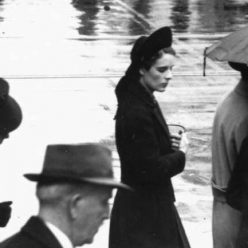They called Hamayag Saroyan the rubbish king, and like any king, he was jealous of his subjects. When a restaurant canceled his hauling contract, King Hamayag left his Montebello castle and went to Main Street to stake out the place and learn what other potentate dared to pick up his trash.
His majesty, 64, stood watching from a parking lot next to the Jeffries Banknote Co. at 117 Winston Street, just one more set of eyes in the naked city. Then suddenly a man broke away from the crowd, brushed against Saroyan, and left him reeling. The old man cried out, and stumbled across the narrow street, then up the steps of a coffee shop at 128 Winston Street. He looked around at a room full of strangers and croaked, “Help me! I’m hurt. A Negro did it.” Then he fell, dead from two knife wounds in the heart, $49 in his pockets.
Witnesses saw a black man running east on Winston, and said he’d first taken off and neatly folded his bloody coat. Someone gave chase, but lost the fleeing man near 5th and Wall. A month later, J. H. Knox, wanted for a New Orleans stabbing, was picked up on suspicion when he left his Wall Street hotel room for a smoke. But witnesses didn’t think he was the regicide, so cops shipped him back to Louisiana to face justice there.
Hamyag Saroyan’s slaying would go unsolved, and authorities declined to use it as a reason to reopen their year-old grand jury investigation into allegations of a rubbish war between rival contractors.
Those 1955 public hearings, held by Mayor Norris Poulson, had spread some pretty stinky stuff around City Hall, including allegations that large garbage collection agencies were conspiring with dump owners and Teamsters to freeze out independent operators. Trash collectors had to join “the combine” (their local rubbish union plus the Teamsters’ union) or be forced out of business.
One such small fry was William C. Crowder, who picked up 1250 San Fernando Valley customers by offering attractive trash bins with a built-in deodorizer—housewives loved them. But dumps began refusing his loads after he objected to the local union demanding half of his customers as a tithe, and Crowder had to drive all over L.A. until he found a cooperative dump. Then there was Sadie Olive Frank, another Valley trash collector, who testified about harassment, vanishing bins, and sugar in her truck’s gas tank. But it wasn’t just sheeny men who had to toe the line: businesses that hired non-union trash haulers were threatened with picket lines.
Ultimately, Teamsters secretary-treasurer Frank Matula, called the “czar” of west coast trash, was sentenced to prison for his perjured testimony about the rubbish racket he headed. His pal Jimmy Hoffa gave him the going-to-jail present of naming him one of three international trustees of the union, a poke in the eye to the Feds. And Mayor Poulson, stunned by the magnitude of the fraud, ordered his staff to begin work on developing a municipal trash service, which would dump in city-owned ravines.
Muse on all this next time you’re about to complain about the size of your L.A. city trash collection bill.
